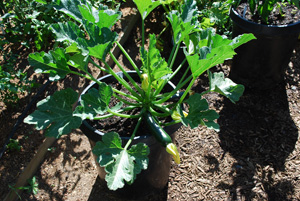Growing Squash in Containers
If you’re growing squash in containers, you’ll need a deep planter box, a large (15-30 gallon) pot, or a half-barrel and a rich potting soil to have any success. Squash are thirsty plants and heavy feeders, challenging to grow organically in the limited root zone of a pot.
|
© Steve Masley…Click IMAGE to Enlarge |
Choose compact bush squash varieties for the best results. ‘Bush Baby’ and ‘Raven’ are good zucchini varieties for containers. ‘Sunburst’ and ‘Starship’ are good candidates for patty-pan squash.
Fruit size, density, and yields are generally smaller for container-grown winter squash. ‘Discus Bush Buttercup’, ‘Bush Delicata’, and ‘Honey Bear’ acorn are the best varieties to try.
Squash Varieties for Containers
Choose compact bush squash varieties for the best results. ‘Bush Baby’, ‘Raven’, and 'Patio Star' are good zucchini varieties for containers. ‘Sunburst’ and ‘Peter Pan’ are good candidates for patty-pan squash.
Fruit size, density, and yields are generally smaller for container-grown winter squash, compared to those grown in the ground, but if you choose the right varieties and tweak the soil you'll get comparable results.
In general, smaller winter squash varieties perform better in containers than larger squash. Acorn squash like 'Table Queen' and 'Honey Bear' work well, as does the 'Bush Delicata'.
If you love buttercup and butternut squash, as I do, there are a few varieties that work better than others. ‘Discus Bush Buttercup’ is similar to 'Burgess' buttercup squash, but produced on a smaller, squatter vine more suitable for containers. Some of the smaller kabocha squash, like 'Shokichi Shiro' will also work.
For butternut squash, 'Burpee Butterbush' is the best variety for containers. The squash are shorter and fatter than 'Waltham 29' and other field-produced butternut squash, but the flavor is the same.
If you're growing squash in containers, you're going to need a large pot or wooden planting box. Half-barrels make great containers for growing squash, but they're very heavy and hard to move. A 30-gallon fabric Smart Pot is an excellent, light-weight alternative that gives you enough soil volume for squash.
A large soil volume makes the plants more resilient, and less likely to dry out as quickly. Squash are thirsty plants and will need daily watering to maintain fast growth and steady fruiting in containers.
I always build slow-release organic soil amendments like good compost, worm castings, alfalfa meal, feather meal, and greensand into my potting mix before I plant (see Fertilizing Container Vegetables for more information). To learn more about organic soil amendments, see the Organic Fertilizers page.For most people, it's simpler and cheaper to use a good, balanced organic fertilizer like Dr. Earth Organic Tomato, Vegetable, and Herb Fertilizer. You can mix some into the potting soil when you plant, and top-dress with a little more 6 weeks later for a mid-season boost.
If you have access to a worm bin, add ½-gallon of fresh worm castings–including worms–to the potting mix. The worms add beneficial bacteria and fungi to the potting mix, and help convert organic soil amendments into plant-available form for your vegetables.
See Growing Vegetables in Containers for more information on vegetable container gardening.
Top of Harvesting Squash Page
|
Summer Squash Varieties
Winter Squash Varieties
|
Growing Squash
Growing Squash in Containers
|
Roasted Winter Squash
Copyright © 2009-2025, by Steve Masley, Grow-it-Organically.com
All rights reserved
HOME | About Us | Contact Us | Privacy


New! Comments
Have a question or comment about what you just read? Leave me a comment in the box below.